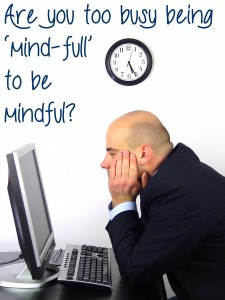Ten minutes a day is enough to move you from stressed-out and ‘mind-less’ to calmer, happier and more mindful. Surely your future life is worth it?
Hi %%FIRST_NAME%%,
Welcome to Day 4 of your 90 days of How To De-Stress With Mindfulness.

Here’s where to listen to the audio recording of today’s message.
[audio:https://s3-eu-west-1.amazonaws.com/htdswm/01/Day04-full-message.mp3]
![]() To download it to listen offline, right click and choose ‘save as’ for this link: Day 4 MP3
To download it to listen offline, right click and choose ‘save as’ for this link: Day 4 MP3
How did you get on with the techniques in the day one email? Have you had a chance to ‘play’ with them yet?
You’ll notice that I always talking about ‘playing’ and ‘experimenting’ with the stuff we’re learning – it’s so important not to take all of this (or life in general) too seriously – it would set you up to feel that things are difficult.
By talking about ‘playing’, you’re giving your unconscious mind ‘permission’ to try something new, without risk of judgement or failure.
It’s a small mindset-shift that can have a big impact.
![]() Perhaps you’d like to share how you have been getting on so far? Or get answers to any questions?
Perhaps you’d like to share how you have been getting on so far? Or get answers to any questions?
As a reminder, all the resources you need for week one are in the members-only area of the online community:
Week One Resources
Today we’re looking at:
- the symptoms of ‘mindlessness’ and why it’s such a big deal
- how to handle the #1 excuse we all make, that stops us from changing our lives
- discovering how to ‘magically’ create the time needed to finish this course
- exploring strategies to help you spot the shifts you’re making
- figuring out how to get moral support for your de-stressing efforts
- as well as busting some of your favourite excuses.
What Is ‘Mindlessness’ and Why Should You Care?
Most of us spend our time running around like headless chickens, on some form of semi-conscious auto-pilot, with little memory of anything we have done, during the day.
It’s as though we’re sleep-walking.
We’re more ‘mind-less’ than ‘mindful’.
And one of the great things about spotting our personal favourite ‘mindless’ behaviours is that we can use them to track how our ‘mindful living’ (and hence de-stressing) is shifting – improving 🙂 – over time.

Common Symptoms of ‘Mindlessness’
- Do you remember what your last cup of tea tasted like?
- Do you often lose your keys / wallet / bag?
- Do you remember conversations, but can’t remember who they were with?
- Do you get half way through a sentence and then forget what you were going to say?
- Do you walk into a room, then forget why you went in there?
- Do you find it hard to concentrate on a topic and think clearly about it?
- Do you really ‘connect’ with people, when you talk to them?
- Do you get to taste your food?
- Do you notice what it feels like, to get dressed in the morning, or brush your teeth?
- Do you reach the end of your day and find it difficult to remember what you did?
- Do you have to ask people to repeat themselves, realising you had heard them, but hadn’t taken in what they said?
- Do you find that time flies and, no matter how hard you work, you still don’t get things done?
- Do you find that you get ‘stuck’ in your thinking mind, going round and round thinking about the things that are stressing you?
Note how many of these behaviours could also be described as symptoms of stress? It’s not a coincidence that mindfulness techniques are such a good remedy for high stress levels.
![]() I’m curious, how do you experience ‘mindlessness’? We all do it in our own, special way!
I’m curious, how do you experience ‘mindlessness’? We all do it in our own, special way!
Here’s a special discussion thread in the online forum where you can share your experiences of ‘mindlessness’ – and find out how others ‘do’ it.
How do you experience ‘mindlessness’?
How Do We End Up ‘Mindless’?
It’s a habit. It’s something we’re taught, from a young age. We’re encourages to move into our ‘thinking mind’ at a very young age, nowadays – often long before that part of our brain is developed enough to be ready for it.
‘Thinking’ is valued much more than ‘conscious doing’ and ‘living in the moment’. That’s one of the reasons why our four-year-olds are now being forced to move out of being fully absorbed in physical play, to learn reading and writing and ‘thinking’ before their brains have even developed congnitive functions.
At work, we’re sent on courses, to learn how to ‘manage our time’ and efficiently ‘mulit-task’; we are pushed to ‘get more done’ and ‘be more busy’.
Yet the best strategic thinking happens with a calm and mindful brain, not one that is stress-out and over-full.
I remember a mentoring client of mine, many years ago, telling me he didn’t feel guilty about going to play golf in the middle of the day. He said it helped him to relax and clear his mind. When he was playing, he would usually have sudden clarity and insights about the company’s issues and would come up with solutions that could save the company many, many thousands. He was getting himself out of ‘mindlessness’ and into ‘mindfulness’, with a major improvement in his strategic thinking.
Sometimes ‘Mindlessness’ Is An Avoidance Strategy
‘Hiding in your mind’ can be used as an avoidance strategy. In fact, that’s the most common reason for cultivating the habit of ‘disappearing’ from the present moment.
We create mental distractions, to avoid whatever it is that we have convinced ourselves is lurking for us in the ‘here and now’. We use our thinking mind to tell ourselves stories about ‘what ifs’ from the past and ‘maybes’ from the future, to get away from ‘having to’ face our present.
The Brilliant News Is…
The brilliant news is that the ‘present moment’, the ‘here and now’ doesn’t hold the scary stuff we fear. That’s mostly in our minds and the ‘present reality’ is rarely as bad as the stories we were telling ourselves about it.
In fact, it’s the only place that holds the key to us setting ourselves free from those fears. And getting ‘back to the now’ is as simple as training ourselves to let go of those old habits.
In teaching ourselves to be ‘mindless’, we forgot our natural state of ‘mindfulness’. Remembering how to get back there is simple – it just needs practice.
‘Mindfulness’ is our natural state of being.
It’s not difficult. It’s not scary.
Yes, visionaries like Thich Nhat Hanh have dedicated a lifetime to practising mindfulness. But you don’t have to, to experience its magic.
Thich Nhat Hanh could be compared to an Olympic athlete, who dedicates many hours a day to perfecting a skill. But we all understand that you don’t have to become an Olympic athlete, in order to feel physically fit. Regular practice is plenty, for most of us.
And it’s the same with mindfulness.
In contrast to physical fitness, you can ‘tone your mindfulness muscles’ with just a few minutes’ practice, at regular points during your day.
The best way to learn mindfulness is to weave it into your day-to-day activities. And that’s exactly what you’re going to be learning (or rather, remembering how!) to do during the 90 days of this course.
Dealing with the #1 life-change excuse, once and for all!
But I Don’t Have Time!
How do you find time to make changes in your life?
This is one of the most common reasons I hear from people about why they don’t make changes… and I have to confess that I have lost count of how often I have used it myself!
When you’re stuck in the middle of ‘doing’ your old habit, it can feel difficult to take the time out to stand back and become aware of what you are doing and which bits you want to change. Yet that time will repay you every single day, for the rest of your life.
Someone I was talking to recently about this course was raving about wanting to de-stress. And she was excited about the idea of being able to lay the foundations, day by day, in the comfort of her own home. But when I asked her if she could spare ten minutes a day for it, her answer was, “No! I’m way too busy!”
She was so convinced by her excuse that there was no room left for her to change.
She would rather spend the next fifty years going through the pain of feeling super-stressed – and all the dis-ease that brings with it – than dedicate ten minutes a day to making the shifts she said she wanted.
There are so many reasons why this can happen – and we’ll be dealing with many of them over the 90 days – but without awareness and inspired action, nothing will change.
Is it really true that our lives are too full to find time to de-stress?
Surely much of our time is used up by the very stress patterns we want to shift?
How To Magically Create More Time
It is true that we often believe that we don’t have enough time. But there’s a difference between truth and belief.
We believe our stories and excuses, telling them to ourselves so often that they become a pseudo-truth that we no longer question – like ‘received wisdom’. We even start to believe in other people’s excuses! But is it really true?
It’s funny how, for example, if we fall in love, we suddenly find plenty of evenings and weekends to spend with that wonderful new person:
- we watch less TV
- we read fewer magazines
- we spend less time on chores
- we use our time more intentionally
- we drop anything that’s not essential
Is it really too much for your mind, body and soul to ask for ten minutes of your time each day for something that can dramatically impact your life?
There are many ‘important jobs’ and distractions during the day that steal our time; things that crop up unexpectedly, where we give them our immediate attention. Everything else falls off the table, including the time we had set aside for working ‘on ourselves’. Yet if we said to those distractions, “I will come back to you later,” it’s amazing how they either go away or take up less time.
The classic example is a phone call.
You’re in the middle of something important, but you answer the phone anyway. The conversation takes ten minutes. Then you go back to what you were doing.
You found ten minutes for the interruption.
So why do we find it so hard to find ten minutes to change our lives…?
How To Find 10 Minutes A Day
[audio:https://s3-eu-west-1.amazonaws.com/htdswm/01/Day04-how-to-get-moral-support.mp3]
I’m curious: what kind of things do you do in ten minutes in a typical day?
Are there other things that you could let go of, even just for a few weeks, while you work through this course?
As a quick exercise, how about brainstorming a list of things that you do during the day that might be wasting your time or that you could do a bit less of?
Yes, right now!
Maybe you could watch ten minutes’ less television? Maybe you could choose not to watch the news?
Or spend ten minutes less per day on Facebook?
Or get someone else to do the washing up?
Or you could fit your mindfulness practices in during your lunch break?
Stuck for inspiration?
How about asking your friends for ideas and asking for help with your top time wasters?
What could you let go of or rearrange about your day, to make time for just ten minutes of mindfulness?
![]() Want to share your answers? Want some moral support on this? Need inspiration from others? Here’s the discussion thread for this topic:
Want to share your answers? Want some moral support on this? Need inspiration from others? Here’s the discussion thread for this topic:
How to find time to change your life.
Are you filling your time with things to do? It’s nearly an epidemic. It’s as though we’re so scared of ‘stopping’ and ‘being’ that we feel guilty about doing ‘nothing’.

Want A Mindset Shift?
Here’s a mindset-shift that works like a ‘magic wand’ if you have – like most of us – ‘time issues’.
Instead of focussing on how you have too much to do and too little time in which to do it, how about applying this life-changing mantra – and watching the stress melt away:
I am grateful for the time I have.
Notice the gentle shift and the feeling of relief?

Today’s Affirmation:
I am grateful for the time I have. I choose to make friends with time, instead of fighting it.
![]() Want to share how you’re getting on with the whole ‘time’ thing?
Want to share how you’re getting on with the whole ‘time’ thing?
What kind of impact does ‘time’ have on your stress levels?
How are you going to be handling things differently?
What’s the big fuss about ‘time’?
How To Notice The Shifts You’re Making
 Sometimes, when we’re making changes in our lives, it can feel hard to notice – and to honour –the progress we are making. One of the simplest ways to do it is to keep a journal – to write things down, as you notice them, so you can reflect on them over the coming weeks and months.
Sometimes, when we’re making changes in our lives, it can feel hard to notice – and to honour –the progress we are making. One of the simplest ways to do it is to keep a journal – to write things down, as you notice them, so you can reflect on them over the coming weeks and months.
This means scribbling down your thoughts, as they come to you, each day – noting what you have learned and experienced.
Having a written record that celebrates the times when the techniques worked for you will help you keep going, should there be times when you fall back into old habits.
Shifting the way you ‘do’ stress can take a little time – and consistent effort. Sometimes people give up because they’re not seeing instant results – but results take time… and sometimes we’re too busy to notice the changes we’re making. We wouldn’t expect to buy a pair of running shoes and suddenly be in the Olympics a week later!
De-stressing is a skill, just like any other we choose to develop. It takes practice. We often don’t notice the improvements we have made and the changes that it has brought to our life until we re-read things that we wrote in our journal several weeks or months before.
So you might want to get yourself a notebook and a pen and spend some time each day – or every few days – writing down what your experiences have been; any suggestions; any insights.
Keeping a journal is a useful practice for marking the progress you are making on your journey. It can make a huge difference to your motivation. It could help you to really get clear about your stress triggers and common auto-pilot patterns, helping you to make even faster progress.
![]() How are you going to be spotting your progress? Which shifts are you going to be looking for? How will you make sure you give yourself credit for the changes you’re making? Here’s the discussion thread:
How are you going to be spotting your progress? Which shifts are you going to be looking for? How will you make sure you give yourself credit for the changes you’re making? Here’s the discussion thread:
How to spot the progress you’re making.
How To Get Moral Support
And finally, today we’re talking moral support.
Sometimes, when we want to start a new habit, the most difficult place to get moral support is at home. Yet it can make all the difference to us when those with whom we spend the most time understand what it is we are trying to achieve – and support us on that journey.
One of the most important ways to get moral support at home (or at work, if that’s where you’re going to be focussing your de-stressing efforts) is to know why you want to do this.
Yes, we’re back to that one again!
 There was some research, a few years ago, about the impact of telling others why you want to do something.
There was some research, a few years ago, about the impact of telling others why you want to do something.
Psychologists did an experiment in an office. In this study, somebody asked to jump to the front of a long queue for the photocopier. Most of the time the others in the queue said ‘no’. In the final experiment, the researchers got the queue jumper to use the word ‘because’ and then follow it with their reason:
“Please may I jump the queue, because…” and all they said was, “I have some photocopying to do. ”
Everybody else in the queue had the same reason for standing there (unless they were just chatting!). Yet nearly everybody willingly let the person jump the queue.
It shows the power of the word ‘because’.
If you talk to your family and explain why you’re choosing to spend ten minutes a day working through How To De-Stress With Mindfulness and the NLP & Mindfulness exercises, it will be easier for them to support you. They will be much more likely to give you the time and space you need. They are less likely to distract you and are more likely to be actively interested in what you’re up to – perhaps even joining in!
What is your ‘because’?
Knowing your ‘because’, your ‘why’ for de-stressing helps you ask for moral support at home or work.
You might want to explain to your family how NLP and mindfulness are going to help you feel calmer or happier or more relaxed. Whatever your ‘why’ was back in Day 1, you can share it with them. It will help them to understand.
Tell them what you need from them.
And as your family starts to see the results of your de-stressing practices, they’re more likely to give their support. For example, one student reported:
“I have been feeling so chilled out. In fact, I have just been able to quietly talk my husband out of making a very hasty and ill-judged decision, rather than huffing and puffing and telling him he’s wrong.”
Her practice was already having noticeable benefits for her family.
Sometimes it can feel difficult to voice our needs – to tell others what help we need. But asking for help is essential, if we want to create a new habit that requires the support of others.
What support do you need at home / at work?
Perhaps you need people not to interrupt you; not to distract you; to do the washing up after dinner; to respect your choice; to be quiet for ten minutes; to remind you to do it or even to do it with you?
If there is something you need, it’s not fair to expect them to guess. You need to tell them!
If this is something that you struggle with, then it is really worth looking into Marshall Rosenberg’s inspiring work on Non-Violent Communication. He created processes to help us practise expressing our unmet needs, without creating conflict.
Another person fed back that:
“After chatting with my husband, he understands how important it is for me to have ME time. Thank you for inspiring me to ask for his help with this. It’s been very useful.”
Busy mum of young children
It’s a common theme from students that people say yes, when they ask them for help to fit in their de-stressing and mindfulness time.
Not sure what help you need? Here’s a simple exercise to uncover those unmet needs.
Quick Exercise: Not sure what help you need?
[audio:https://s3-eu-west-1.amazonaws.com/htdswm/01/Day04-unmet-needs.mp3]
If you’re not sure what help you need, you could look again at your excuses:
“I’d be able to do this, if only…
or
“I can’t find time to do this, because…”
The end of the sentence gives clues as to the support you might need.
So my questions for you today are:
What support do you want or need at home to complete How To De-Stress With Mindfulness?
What do you need to do or say to get that support?
![]() Fancy sharing your answers to the questions from this exercise? Want to find out what others are saying? Here’s the discussion thread:
Fancy sharing your answers to the questions from this exercise? Want to find out what others are saying? Here’s the discussion thread:
Getting support for your de-stressing.
That’s it for today. I hope you have found it helpful. Here’s what we’ll be covering next time.
Next time we’ll be talking about:
- Discovering how you, personally, ‘do’ stress and why awareness of this is a vital first step towards shifting those old stress patterns
- How to find the answers you’re looking for, so you can create shifts through inspired action
- The #1 mistake most people make that blocks change
- Two secrets you need to know about how your unconscious mind works, which will set you free from a trap you have probably been falling into for decades
- A profoundly powerful mindset shift and two highly effective ‘Emotional First Aid’ techniques that help cut your stress levels in under sixty seconds
Your next email will be with you in 3-4 days.
Wishing you a wonderful week!
Namaste,
![]()
